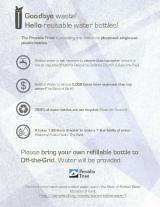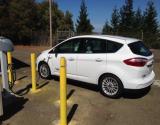2017 Federal Green Challenge Award Winners in the Pacific Southwest Region
Recognition is an important part of the Federal Green Challenge (FGC). Awards were given at the regional level in the categories of Energy, Education and Outreach, Transportation, Purchasing, and Waste.
In the Pacific Southwest region, the 2017 award winners are Presidio Trust, the Department of Veterans Affairs Northern California Health Care System, the Department of Energy Lawrence Livermore National Laboratory (LLNL), the Department of Agriculture Forest Service Region 5, and the General Services Administration San Francisco Federal Building. Below are descriptions of what the awardees achieved and ways they achieved reductions.
Education and Outreach
Presidio Trust, San Francisco, CA
 The Presidio Trust partnered with Off the Grid, an organization that produces events by gathering food truck vendors, to host large-scale outdoor picnic events that often draw nearly 8,000 visitors. The Presidio Trust educated attendees while reducing the events’ environmental impacts, required vendors to use recyclable and compostable food serviceware, banned the sale of disposable plastic water bottles, and reached weekly event diversion rates consistently over 80 percent.
The Presidio Trust partnered with Off the Grid, an organization that produces events by gathering food truck vendors, to host large-scale outdoor picnic events that often draw nearly 8,000 visitors. The Presidio Trust educated attendees while reducing the events’ environmental impacts, required vendors to use recyclable and compostable food serviceware, banned the sale of disposable plastic water bottles, and reached weekly event diversion rates consistently over 80 percent.
- In 2016, the Presidio Trust banned the sale of water bottles at these events. Signage, which highlighted the reasons for the ban, were posted. Large, refillable water containers were provided to attendees. Reusable water bottles were given away at the first picnic with the water bottle ban, and paper cups were provided thereafter. In addition, the Trust adopted standards ensuring that the vendors used recyclable and compostable serviceware for their foods and beverages.
- To prioritize waste diversion, the Presidio Trust hired a group to educate visitors on utilizing the compost, recycling and trash bins at the events. In addition, staff kept the grounds clean during the event so the attendees experienced a large public event with little or no litter.
- Using the actual weight to volume ratios, the event weekly diversion rates consistently topped 80 percent. The Presidio Trust is tracking the waste produced per person each week to assess the effectiveness of the program at both reducing and diverting waste.
- To reduce transportation impacts, the team engaged in outreach to the attendees, set up road-closures, and promoted alternative transportation including "Learn to Bike" classes with helmet give-a-ways for kids.
Energy
Department of Veterans Affairs, Northern California Health Case System (NCHCS), Martinez, California
 The Department of Veterans Affairs, Northern California Health Care System (NCHCS) has continued to make significant advances in energy and water conservation. In 2016, NCHCS performed innovative, low-cost energy and water audits. The audits informed facility energy and water conservation priorities, which contributed to compliance with Executive Order 13693.
The Department of Veterans Affairs, Northern California Health Care System (NCHCS) has continued to make significant advances in energy and water conservation. In 2016, NCHCS performed innovative, low-cost energy and water audits. The audits informed facility energy and water conservation priorities, which contributed to compliance with Executive Order 13693.
NCHCS performed audits of selected facilities, and implemented energy and water conservation measures including:
- Retro-commissioned the photovoltaics system, which generated an estimated 551,000 kilowatt (kW)-hours in 2016.
- Replaced two old, inefficient water-cooled chillers with high-efficiency chillers. The new chillers use less electrical power and have greater cooling capacity, saving over 510,000 kW-hours last year.
- Replaced 5,000 fluorescent light fixtures with LEDs, and installed occupancy sensors in offices to save an estimated 600,000 kW-hours.
- Installed a water management system to prevent over-watering and reduce water usage, thus saving over 1,000,000 gallons of water last year.
- Used 10,000 gallon fueling stations to provide alternate fuel (E-85) to over 50 federal vehicles, and continued to use electric and hybrid vehicles.
Purchasing
Department of Energy, Lawrence Livermore National Laboratory (LLNL), Livermore, California
 Lawrence Livermore National Laboratory (LLNL) has reduced paper usage by almost half since 2009, saving over $85,000 a year. In addition to paper savings, LLNL has trimmed purchases of inks and toners, resulting in reserves of over $500,000 a year.
Lawrence Livermore National Laboratory (LLNL) has reduced paper usage by almost half since 2009, saving over $85,000 a year. In addition to paper savings, LLNL has trimmed purchases of inks and toners, resulting in reserves of over $500,000 a year.
Procedures are reviewed, maintained and referenced online; many reports are submitted via email and most documents are printed only upon request. Moreover, the Laboratory is moving to a managed print model, consolidating copier locations and right-sizing equipment. LLNL raises awareness of pollution prevention and other environmental initiatives through its Environmental Management System, which is registered to the ISO 14001 international standard.
Transportation
 Department of Agriculture, Forest Service Region 5, Vallejo, California
Department of Agriculture, Forest Service Region 5, Vallejo, California
-
Commitment to Cost-Efficient Operations: Recognizing that mobile fleet emissions account for approximately 38 percent of the agency’s emissions, USDA Region 5 has implemented numerous efforts to increase the efficiency of its fleet vehicles. Annually, Region 5 Forest Service reports progress on 11 fleet and transportation-related action items, ranging from sharing eco-driving tips, providing sufficient bicycle parking, calculating and posting the average fuel efficiency of its on-road fleet, and purchasing alternative fuel vehicles, zero emission vehicles, or hybrid vehicles and placing them in the locations that best maximize use.
- Fleet Inventory System Upgrades: Prior to 2016, the Regional Fleet Manager engaged each of its 18 National Forests to obtain fleet information for EPA Federal Green Challenge reporting. The new centralized inventory system is far more accurate than the previous Forest-by-Forest data request approach, and will support improved tracking and monitoring of performance goals in the future.
Waste
Department of Labor, San Francisco Federal Building, San Francisco, CA
 The San Francisco Federal Building increased its recycling and composting by 135 percent from 2015 to 2016. San Francisco has a strong Zero Waste Program that supports comprehensive recycling and composting of organics, including food and food-soiled paper.
The San Francisco Federal Building increased its recycling and composting by 135 percent from 2015 to 2016. San Francisco has a strong Zero Waste Program that supports comprehensive recycling and composting of organics, including food and food-soiled paper.


